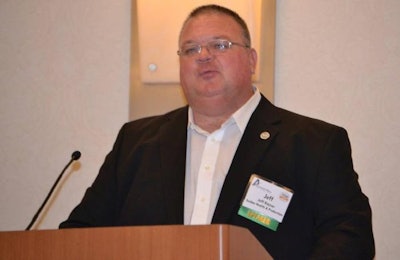
All pig producers should have not only active animal welfare policies, but also an animal welfare crisis management plan, said Jeff Kayser, director of production, Suidae Health and Production.
Kayser shared his message at the Animal Agriculture Alliance Stakeholders Summit on May 6 in Arlington, Virginia.
Every livestock producer’s worst nightmare would be to learn that undercover animal rights activists have visited their farm and filmed footage of animal abuse taking place by workers at the facility.
But there are ways that producers can not only prevent animal abuse situations from happening, but also to be able to better handle them and the public relations challenges if they do occur.
Who to involve when forming a crisis management plan
Kayser urged summit attendees to make sure they have an animal welfare crisis management plan in place.
Any plan developed, according to Kayser, should include the input from:
- Members of the company’s senior management team
- Legal resources
- Industry allies including state and national pork producer organizations
- Veterinarians
- Packers and processors
- Industry peers
According to Kayser, it is better to include as many people with a common interest in the pork industry as possible.
“When (animal abuse) happens in our pork industry, we all have a stake in it,” he said. “Don’t wait until a crisis happens. Make sure those relationships are formulated, and you’re well engaged with them.”
And helping other pork producers that may find themselves in an animal welfare crisis is equally important, he added.
“Make sure you are helping them as an ally, because sometime it may be you that needs the help,” he said.
Things to include in a crisis action plan
When establishing a crisis plan, it is important to know who is handling what duty and how. For instance, a plan needs to be in place regarding how the farm or company is going to interact with the animal rights group involved.
Communications are another key, so it should be known who the contact person with the media will be, and who will communicate with other industry stakeholders who may be concerned.
Kayser stressed to make sure all animal welfare policies are written clearly and are known by employees. The animal welfare policies should also be written in a way that they can be communicated with members of the media, with industry stakeholders and other concerned parties.
Animal welfare policies need to be well documented and all employees should clearly know the standards of conduct. If someone does something that is not allowed, take a zero-tolerance approach, said Kayser. If that happens, the producer should establish who will investigate the reported incident while using a questionnaire of things to be investigated. To make sure the investigation is done fairly, presume anyone who may be involved is innocent, but suspend them with pay until the investigation is completed. Then take further action as needed.
Kayser also suggested being engaged with law enforcement and people within the legal system once it has been learned that alleged abuse has taken place.
Take proactive measures to prevent a crisis
While Kayser shared what should be done should a crisis occur, he also shared details of what can be done to better assure that one never happens in the first place.
He suggested having strict hiring practices and doing background checks.
“If a candidate has a history of abusing or harassing another human being, we won’t hire them, because if they’ll do it to a human, they’ll likely to do it to an animal,” he said.
He also says it is important to make sure that candidates don’t believe in or actions done by groups like Humane Society of the United States (HSUS) or Mercy for Animals, because if they support what those groups do, they do not support pork production.
He also recommended that each farm or company does self-auditing of how well it follows its animal welfare program and involve an unbiased animal health expert to also perform an audit.
Finally, it’s better to err on the side of caution. “If in doubt on any animal care situation, if you would not want a picture of you and the situation on the front page of the state newspaper or as a clip on the evening news, then correct the animal care situation immediately,” he said.
















